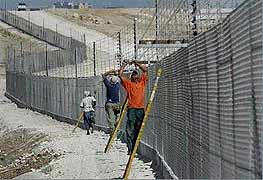Rogue Nation Israel - It's Official
A World Crisis Web Report
In a decision that marks a gauge of world opinion, the UN General Assembly today overwhelmingly approved a resolution demanding that Israel remove it’s “separation barrier”. The resolution “demands that Israel stop and reverse the construction of the wall in the occupied Palestinian territory, including in and around East Jerusalem, which is in departure of the Armistice Line of 1949 and is in contradiction to relevant provisions of international law.”

The barrier will entrench the occupation, squeeze Palestinians further into ghettos, and ensure further instability and violence in the region.
Partly eight-metre-high concrete wall, and partly steel fence, the barrier is equipped with electronic sensors, is flanked by trenches, razor wire and a patrol road, and is seen by Palestinians as an apartheid measure. The vote was seen not as opposition to the principle of a barrier, but to its construction deep inside the West Bank. Many see it as a thinly disguised land grab prior to negotiations about the eventual borders of a future Palestinian state.
The UN General Assembly vote was passed by a huge majority of 144 states in favour, and four against. The resolution requests Secretary General Kofi Annan to submit periodic reports on Israel’s compliance, with the first due within one month. Once the report is received, it says, “further actions should be considered, if necessary, within the United Nations system.”
In response to this unprecedented and overwhelming condemnation from the world’s governments, Israel vowed only to continue building the barrier. “The fence will continue being built and we will go on taking care of the security of Israel’s citizens,” said Ehud Olmert, Israel’s deputy Prime Minister.
Indeed, according to Kieran Prendergast, UN Under-Secretary-General for Political Affairs, Israel has quickened the pace of erecting the barrier, with the effect of dividing Palestinian communities and families, and of threatening to seal off Jerusalem from the West Bank. “Over the last month the speed of construction has accelerated,” said Mr. Prendergast, “Palestinians along the barrier’s route face land loss and severely restricted access to jobs, markets and essential social services?We repeat our call to the Israeli authorities to halt construction of the wall.”
A recent report from all three co-chairs of the UN’s Local Aid Coordination Committee for Palestine said that around East Jerusalem the barrier “affects tens of thousands of Palestinians, as it divide communities and families and threatens to seal Jerusalem off from the rest of the West Bank,”
Earlier this month, the Israeli Defence Force issued an order on the areas between the barrier and the 1967 Green Line, specifying that “people aged 12 years and older who resided in these areas before the military order was issued must now have entry permits to continue doing so. Free access will be granted only to Israelis,”
In a development that adds greater political significance to the UN resolution, all 15 European Union states voted in favour the motion, which said that the barrier was “in contradiction to international law”, and demanded that Israel “stop and reverse” its construction inside Palestinian territory. Apart from the USA and Israel, only the Marshall Islands and Micronesia opposed the resolution.
European support was reached only after exceptional public negotiations between the European Union and Arab nations on the final text. Negotiations dragged on for more than six hours after the vote was scheduled, and for several hours moved into the hallways outside the General Assembly hall. In the end, Palestinians agreed to submit an amended motion that replaced the term “illegal”, describing the barrier, with one which spoke of Israel being “in contradiction to relevant provisions of international law”.
In return for EU support, the Palestinians also agreed to put on hold a second resolution that would have asked the International Court of Justice at The Hague, Netherlands, for an advisory opinion on the legality of the barrier. Chief Palestinian negotiator Saeb Erekat nevertheless said, “The world has just sent a powerful message that the shortest way to peace is not through settlements and walls, but rather through a meaningful peace process that will end the Israeli occupation that began in 1967,”
Denunciations of the UN resolutions swiftly came from Israel and the USA. Deputy Ambassador James Cunningham said his government couldn’t support it because it still makes a legal judgment and doesn’t name Palestinian terrorist groups carrying out suicide bombings in Israel.
During negotiations leading up to the vote, Israel’s UN Ambassador Dan Gillerman, said that the Palestinian proposal threatened to turn the UN’s principal legal body “into a political weapon for one party to a conflict [and] is a dangerous precedent,” Gillerman warned. “It should be rejected out of hand, not legitimized by pandering in a negotiating process.” In response, the Palestinian UN observer, Al-Kidwa, accused Gillerman of “intimidation and blackmail,” stressing the political and legal importance of the resolution.
Published Wednesday, October 22nd, 2003 - 12:25pm GMT
Click here, for a map of the Sharon government’s proposed route for the barrier.
This is the print-ready version of Rogue Nation Israel - It's Official
A World Crisis Web Report
It was found in the Israel and Occupation section of the World Crisis Web.
To view and post your views on the article in full go to http://www.world-crisis.com/analysis_comments/P115_0_15_0/